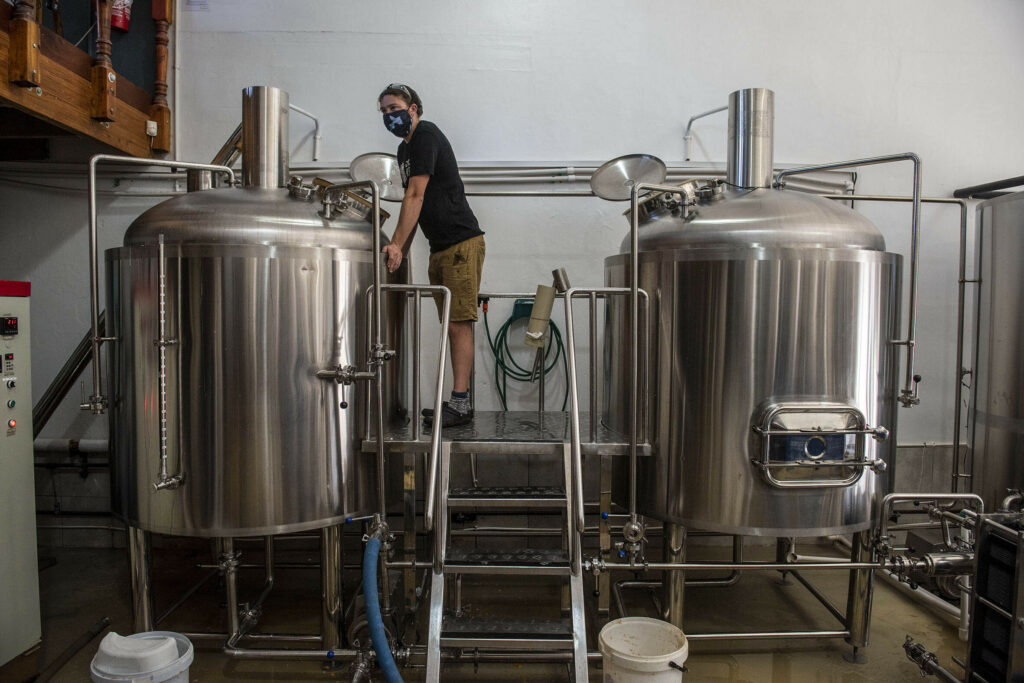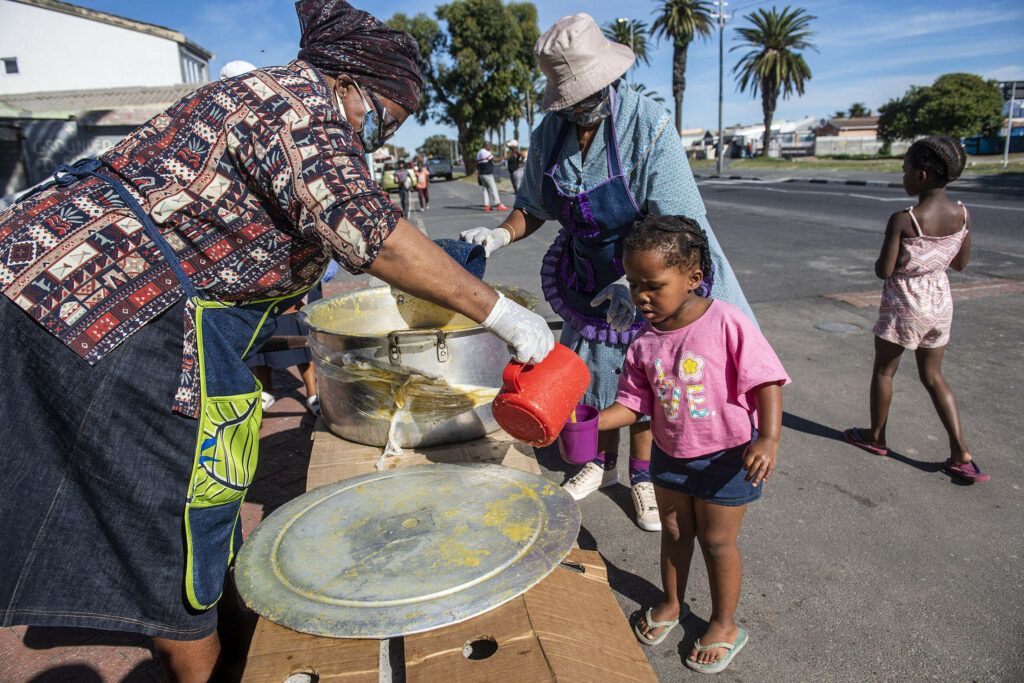Pots filled with soup outside Drifters Brewery on Woodstock main road. Cape Town brewing companies Woodstock Brewery and Drifters Brewery have begun to use their brewing equipment to start a soup making initiative to assist in feeding vulnerable communities around Cape Town during the Covid-19 lockdown. (David Harrison/M&G)
It’s the reversal of the biblical miracle. Instead of turning water into wine, a collective of Cape Town microbreweries and businesses are making soup to support the Covid-19 food relief effort.
They call themselves Souper Heroes. Although the Woodstock Brewery, the Drifter Brewing Company and Stellenbosch Breweries are unable to make beer under lockdown regulations, they are not remaining idle.
“We are looking forward to catching up over a beer when the lockdown is over,” said Woodstock Brewery owner Andre Viljoen.
 Nick Bush checking on the soup being made at Drifters Brewery on Woodstock Main Road. Cape Town brewing companies Woodstock Brewery & Drifters Brewery have begun to use their brewing equipment to start a soup making initiative to assist in feeding vulnerable communities around Cape Town during the COVID-19 lockdown. (Photo by David Harrison/M&G)
Nick Bush checking on the soup being made at Drifters Brewery on Woodstock Main Road. Cape Town brewing companies Woodstock Brewery & Drifters Brewery have begun to use their brewing equipment to start a soup making initiative to assist in feeding vulnerable communities around Cape Town during the COVID-19 lockdown. (Photo by David Harrison/M&G)
“We know a couple of people were smart enough to stock up for a long lockdown and there are some who have offered to buy vouchers to support us, but we would rather sell beer again in the normal way when we are allowed to. There is time for that. For now, we want to focus on more pressing needs. And that is to produce soup and porridge for the immediate needs of the less fortunate.”
Viljoen said the science to making soup is simpler than brewing beer. Two 2000-litre pots that are usually used to heat water and mash grains into sugars to aid fermentation. To make soup, heat water, add fresh vegetables, and season.
“It’s also so much simpler cleaning soup from the pots than it is cleaning the sugar water solution,” he added.
A brewery’s beerhouse is simply a huge kitchen with large pots, Viljoen said.
“I was working a shift in a friend’s kitchen and then the penny dropped. We have all of the resources. Big pots with stirrers in them. There’s an efficient heating system. We just add the ingredients, and then there’s soup.”
There’s no risk of contamination because the fermentation process happens in another section.
Lockdown, with its restrictions on the sale of alcohol, has taken its toll on breweries, particularly microbreweries, brew pubs and restaurants. Viljoen said that for now their mission is bigger — to feed thousands of hungry people daily.
The collective is churning out some 3000 litres of soup a day, feeding about 9000 people in 10 areas around Cape Town. It’s helping smaller soup kitchens that often struggle to make meals on a large scale because of inadequate sources of heat.
 May 06 2020 – Soup feeding program out in Langa where local community activist Maxi Mhloane delivers to several old age homes as well as an orphanage. Cape Town brewing companies Woodstock Brewery & Drifters Brewery have begun to use their brewing equipment to start a soup making initiative to asssit in feeding around fourteen vulnerable communities around Cape Town during the COVID-19 lockdown. (Photo by David Harrison/M&G)
May 06 2020 – Soup feeding program out in Langa where local community activist Maxi Mhloane delivers to several old age homes as well as an orphanage. Cape Town brewing companies Woodstock Brewery & Drifters Brewery have begun to use their brewing equipment to start a soup making initiative to asssit in feeding around fourteen vulnerable communities around Cape Town during the COVID-19 lockdown. (Photo by David Harrison/M&G)
Level 4 restrictions don’t allow breweries to operate, which means employees cannot go to work. Volunteers help the collective by cutting up vegetables and dispatching the soup to those in need.
As restrictions ease up, more workers will be able to return to work and earn an income. But Viljoen said they won’t start brewing beer for a while.
“The fact that on-consumption of beer and alcohol will probably be delayed a bit gives us time to wait it out a little and continue producing soup.”